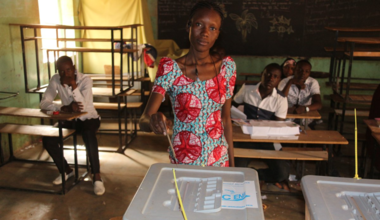Security Council praises progress towards peace and stability in West Africa
8 July 2011 - The Security Council today voiced satisfaction with the progress countries in West Africa are making towards greater peace and stability, welcoming the positive developments in post-conflict recovery and peacebuilding, particularly in Guinea and Niger, as well as the end of the violent post-election crisis in Côte d’Ivoire.
The Council, however, expressed concern that the progress remains fragile, especially in view of recurrent threats to peace and security in the sub-region, including terrorism and trans-national organized crime, illicit drug trafficking and as well as election-related violence.
“The Security Council stressed the importance of strengthening trans-regional and international cooperation on the basis of a common and shared responsibility to counter the world drug problem and related criminal activities, and in support of relevant national, sub-regional and regional organizations and mechanisms, including with the view to strengthening the rule of law,” Ambassador Peter Wittig of Germany, which holds the Council’s rotating presidency this month, said in a statement read to the press.
In the statement, issued after a briefing by Said Djinnit, the Special Representative of the Secretary-General for West Africa, the Council welcomed efforts by the African Union and the Economic Community of West African States (ECOWAS) to address unconstitutional changes of government and to consolidate democratic practices and institutions, particularly through security sector reform, the promotion of human rights and the involvement of women in conflict prevention and resolution.
The Council encouraged the continued engagement of the international community to ensure that progress made in preventing conflict and consolidating democracy in West Africa is sustained.
It encouraged the UN Office for West Africa (UNOWA) to continue to promote and strengthen a regional and integrated approach to issues in West Africa, including those which have a cross-border dimension, in particular the threat of terrorism in the Sahel, security sector reform, trans-national organized crime, including illicit drug trafficking, the promotion of good governance and human rights.
In his briefing to the Council, Mr. Djinnit stressed the need to comprehensively address issues of development, governance and security in West African countries.
“Despite the praiseworthy efforts they are undertaking within the framework of promoting development and stability they [countries] continue to be vulnerable and fragile, therefore deserving a determined and steadfast support from the international community,” he said.
In his latest report to the Council on the activities of UNOWA, Secretary-General Ban Ki-moon also points out that with the end of the crisis in Côte d’Ivoire, the restoration of constitutional order and democracy in Guinea and Niger, as well as peaceful and fair elections in Benin and Nigeria, the sub-region is witnessing a new momentum towards peace and democracy.
“While paving the way for stability, reconstruction and development, those encouraging achievements have regrettably not completely reversed the potential of new rounds of instability, which remain a reality in several countries, as illustrated by recent developments in Burkina Faso and the simmering tensions observed in other countries of the sub-region,” Mr. Ban notes in the report.
He says that UNOWA will continue to support initiatives aimed at consolidating the gains that are consistent with its revised mandate. It will also concentrate on addressing cross-border and cross-cutting challenges to peace, security and stability, in particular election-related crisis and violence, challenges related to security sector reform and trans-national crime, notably drug trafficking and terrorism.
 UN
UN





